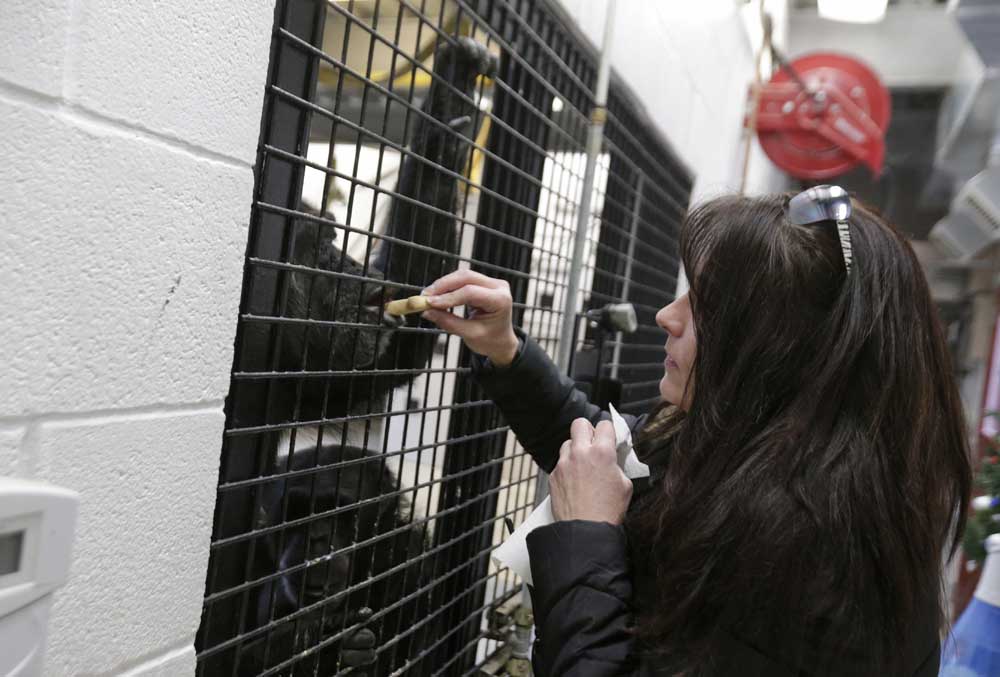Chimps Inc. settles safety citations, still faces labor charges
Published 12:00 am Monday, September 17, 2018

- Former Chimps Inc. Executive Director Marla Meyer, who is now the director of operations, feeds one of the chimps at Chimps Inc. in December at the facility outside Tumalo. (Joe Kline/Bulletin photo)
Chimps Inc., a nonprofit chimpanzee sanctuary in Tumalo, recently settled with the Oregon Occupational Safety and Health Administration, after appealing 10 safety-related violations.
But the sanctuary, where chimpanzees have bitten off the fingers of workers, now faces charges from a separate state agency that could potentially result in $81,500 in fines.
Trending
OSHA inspectors visited Chimps Inc. three times last year and identified the safety violations, which included unsecured doors, poor emergency planning and employees unsafely working alone.
The inspectors also uncovered 30 incidents in past years, including cage doors left open and chimpanzees that had escaped or attacked workers, resulting in bites, scratches, bruises, skin being completely torn off hands and at least four finger or thumb amputations.
OSHA recommended a $20,920 fine, but Chimps Inc. appealed and was ultimately fined $12,520, closing the case.
But now the chimpanzee sanctuary faces potentially even more costly accusations, this time from the state Bureau of Labor and Industries. The bureau last month filed formal charges of unlawful practices against the sanctuary related to complaints from three former employees.
The three employees — Aleeza Davis, Zeya Wagner and Jennifer Harris — each filed complaints in May 2017 with the state bureau, saying they were fired for refusing to sign waivers, including one that waived their right to call 911 in an emergency.
The bureau reviewed the claims and determined there was enough evidence to formally charge Chimps Inc. with unlawful practices that could result in a maximum fine of $81,500 to reimburse the three former employees.
Trending
A hearing is tentatively scheduled for November to address the charges.
Workplace safety first became a public issue at Chimps Inc. in 2008, when an intern, Kristen Howard, was attacked by a chimpanzee that came through an unlocked tunnel connected to a cage Howard and another intern were cleaning. Howard lost most of a thumb in the attack.
Howard sued for $828,000, but the case was dismissed in 2012.
Chimps Inc. staff was unavailable for comment this week. But in an interview with The Bulletin in December, then-Executive Director Marla Meyer detailed the ways the sanctuary had addressed its safety issues.
A major fix was sealing shut the sliding feed doors. Now, the chimpanzees are only fed through tilting feeding doors, which help keep employees’ hands away from the chimpanzees.
At the time, Meyer expressed a willingness to work with OSHA.
“I told OSHA, you can stop by anytime,” said Meyer, who is now the director of operations. “If we can make this place even better, we are all for it. I think that is why we have such a good working relationship.”
Many of the safety issues found by OSHA inspectors last year directly related to sanctuary founder Lesley Day. Inspectors blamed her casual and dangerous interactions with the chimpanzees.
Day, who lost her right pinkie finger in July 2013 when a chimpanzee bit it off, would open enclosure doors and feed doors and leave them unlocked after work hours. Employees would arrive for work the next morning and be in danger of an attack by an unsecured chimpanzee, according to OSHA’s report.
Day stepped down as president of the sanctuary last summer and no longer has authority over the staff, according to Meyer. In addition, all of the locks have been changed, and Day does not have any keys.
“She resigned her position as president,” Meyer said in December. “She is no longer active at daily operations.”
Before stepping down, Day shared frustrations during an interview with an OSHA inspector about how the inspection was ruining her access and contact with the chimpanzees.
“We had to lock the slide door in the front enclosure after your last visit,” Day said. “I can only contact the chimps through the enclosures. It’s not like it used to be, and the chimps miss it.”
Chimps Inc. opened in 1995 and now houses seven chimpanzees, who were rescued from private owners who used them for entertainment at venues such as Marine World in California and shows in Las Vegas.
The sanctuary operates with an annual budget of about $300,000, according to public records.
— Reporter: 541-617-7820, kspurr@bendbulletin.com








